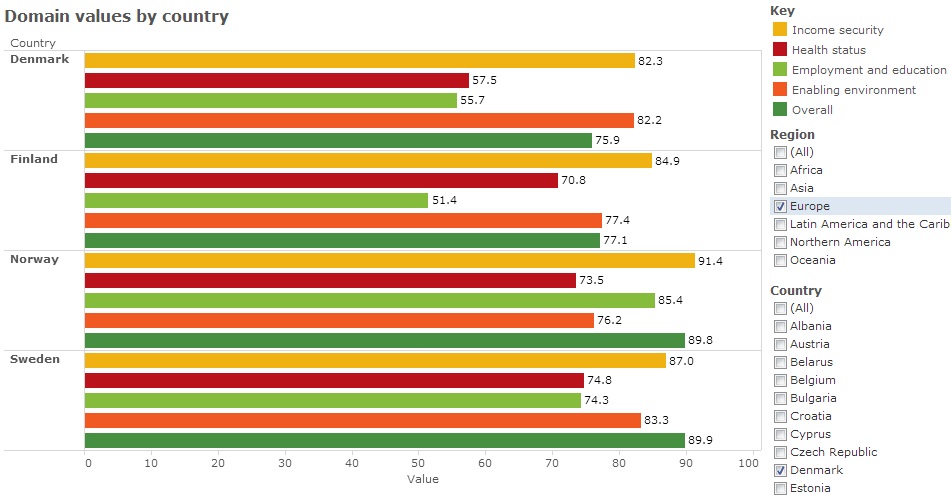 The Global AgeWatch Index 2013 is the first ever tool to measure the quality of life and wellbeing of older people around the world. It responds to the urgent need to tackle the poverty and discrimination faced by the growing numbers of older people across the globe and demonstrates there is much to do.
The Global AgeWatch Index 2013 is the first ever tool to measure the quality of life and wellbeing of older people around the world. It responds to the urgent need to tackle the poverty and discrimination faced by the growing numbers of older people across the globe and demonstrates there is much to do.
What is exciting and new about the index is that it looks well beyond health and income, to employment prospects and education of older people. It explores how supported they feel by family, government and community.
These issues are just as important to people of 70 as they are to parents, children and youth.
What does the Index tell us?
The Global AgeWatch Index shows that good management of ageing is within reach of all
governments. The rankings illustrate that limited resources need not be a barrier to countries providing for their older citizens, that a history of progressive social welfare policies makes a difference, and that it is never too soon to prepare for population ageing.
A running thread is that action in the key areas of income security and health is essential.
 Money isn’t everything
Money isn’t everything
The global ranking of countries shows that older people are faring best in Nordic, Western European, North American and some East Asian and Latin American
countries
Sweden (1) features in the top 10 in all four domains: Income security, Health status, Employment and education, and Enabling environment. The other places
in the top 10 are filled by two more Nordic countries – Norway (2) and Iceland (9), three from Western Europe – Germany (3), the Netherlands (4) and Switzerland (6), two North American countries – Canada (5) and the USA (8), and two countries in Asia and the Pacific –New Zealand (7) and Japan (10). Austria (11), Ireland (12), the UK (13) and Australia (14) are also among the top 15 countries.
History counts
The Index shows that people in countries with a record of enacting progressive social welfare policies for all their citizens across the life-course are more likely to reap the benefits in terms of better health and wellbeing and a sense of social connectedness in old age.
This year, Sweden (1) is celebrating the centenary of its universal pension, a system put in place at a time when the country was what would now be called an “emerging economy”. Similarly, Norway (2) introduced its universal rights-based pension in 1937, long before it achieved its current high-income status. Mauritius (33) introduced a universal pension in 1958.
Source:
www.helpage.org/global-agewatch
Photos:
Sofia Sabel/imagebank.sweden.se
www.helpage.org



 EUR 4.2563 zł
EUR 4.2563 zł USD 3.6432 zł
USD 3.6432 zł DKK 0.5704 zł
DKK 0.5704 zł SEK 0.382 zł
SEK 0.382 zł NOK 0.3597 zł
NOK 0.3597 zł